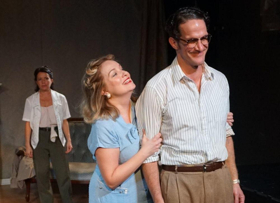Review: SArTrE! 'No Exit' brings Hell to the Chapel.

No-Exit appeared in 1944 and (at least in my day) it was on the required reading list of every theater freshman. It is a very important play and in the '50's and '60's it received thousands of productions--many on college campuses. But it is no longer often seen. I was delighted when I heard that SATE was doing this new translation.
We find ourselves in Hell, but not quite the Hell we'd expect--no fire, no pitchforks, no tools of torture. It's just a simple room, furnished comfortably with two sofas and a chair. There is one door. After a moment the door opens and a man enters. This is Garcin (Shane Signorino). An attendant or valet steps in (Katy Keating). Garcin demands an explanation, but the valet--pleasant, polite and strangely amused--will give him no real suggestion of what to expect. She withdraws, leaving Garcin alone.
Shortly a woman is brought in. This is Inès (Sarah Morris). And finally another woman joins them--Estelle (Rachel Tibbetts). These three will soon discover that the absence of instruments of torture does not mean there is to be no suffering in Hell; these three, locked for eternity together, are to become each other's torturers.
"Hell is other people."
Garcin is a Brazilian who had published a pacifist newspaper in Rio and died with twelve bullets in his chest. Inès was a mere postal worker, and Estelle a rich and fashionable trophy wife. The reasons for their damnations are things that they are reluctant to admit even to themselves. Over these ninety minutes, as their stories unravel, we learn that the reasons include infidelities, murder, suicide and a cowardly betrayal of a noble cause.
The conflict that flares among them is kindled by sexual attraction and frustration. Inès, a lesbian, lusts after Estelle. She prowls lithely around Estelle, soft-footed as a panther. Estelle would normally be content to admire herself in a mirror, but there are no mirrors in Hell, so she needs a man to validate her beauty; she sets her cap for Garcin. But Garcin understands that to avoid torture they must not interact with each other, so he simply wants to be left alone. Eros is stifled between Inès and Estelle because Garcin is there; it is stifled between Estelle and Garcin because Inès is there. And between lesbian Inès and Garcin, a macho man? Well, that's simply a non-starter.
Inès seems intent on keeping the punishment going; she takes glee in it. All the players give strong performances, but Ms. Morris as Inès shows the fiercest fire.
Occasionally, as if in a dream, the outside world appears to one or another of the characters--taunting or blaming them.
In the end they are all stripped emotionally naked--shamed, exhausted. And the cycle starts anew.
In Sartre's Existentialism we are not born with a "soul" or "self". It is our choices throughout life that build that essence. It is the evils these people have chosen to do that have made them into creatures deserving the torture we see before us. And it is their self-obsession that renders them vulnerable to that torture.
Director Bess Moynihan manages her cast gracefully in the small three-quarter-round space, keeping the players moving to serve all sides.
It's a very strong production, but there are a few touches that could have made it even stronger:
- Violent emotions blaze forth, but these are too often expressed in mere shouting. An intimate space like this would nicely support subtler modes of hatred.
- There is little use of pauses to build the vitriol--or to suffer from it. There are occasions where in answer to a question or a demand, instead of the quick responses that are consistently given, a tiny pause to find or relish the most hurtful reply would have been delicious.
- The several erotic moments are somehow lacking any convincing sexual chemistry--as if the actions are done only to taunt the odd-man-out.
And now a mere quibble: some French-speaker should have audited the pronunciation of the words "Monsieur" and "Mademoiselle". These are consistently pronounced in a manner far afield from native French conversation. And the way everyone pronounced M. Garcin's name made me think they were calling for a waiter ("garçon"). (Another thing: translations often use "Mr. Garcin". Why use a French form of address for a man who is a Brazilian speaking English? The valet might show proper courtesy by addressing him as "Senhor".)
The set by Ms. Moynihan, lighting by Michael Sullivan, costumes by Marcy Ann Wiegert and sound design by Ellie Schwetye are all well-done and appropriate--nothing surprising, but all quite professional.
SATE is a brave and adventuresome little company and we are blessed to have them on our scene. I thank them for bringing us this classic piece of modern theater. Jean-Paul Sartre's No Exit plays through September 1 at The Chapel on Alexander, near Washington University.
Reader Reviews

Videos

